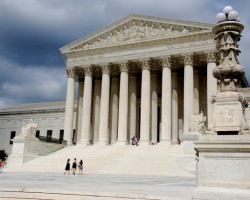
SUPREME COURT OF THE UNITED STATES
Syllabus
JESINOSKI ET UX.
v.
COUNTRYWIDE HOME LOANS, INC., ET AL.
CERTIORARI TO THE UNITED STATES COURT OF APPEALS FOR THE EIGHTH CIRCUIT
No. 13–684. Argued November 4, 2014—Decided January 13, 2015
Exactly three years after borrowing money from respondent Countrywide Home Loans, Inc., to refinance their home mortgage, petitionersLarry and Cheryle Jesinoski sent Countrywide and respondent Bank of America Home Loans, which had acquired Countrywide, a letterpurporting to rescind the transaction. Bank of America replied, refusing to acknowledge the rescission’s validity. One year and one daylater, the Jesinoskis filed suit in federal court, seeking a declarationof rescission and damages. The District Court entered judgment onthe pleadings for respondents, concluding that a borrower can exercise the Truth in Lending Act’s right to rescind a loan, see 15 U. S. C. §1635(a), (f), only by filing a lawsuit within three years of the datethe loan was consummated. The Jesinoskis’ complaint, filed four years and one day after the loan’s consummation, was ineffective. The Eighth Circuit affirmed.
Held: A borrower exercising his right to rescind under the Act need only provide written notice to his lender within the 3-year period, not filesuit within that period. Section 1635(a)’s unequivocal terms—a borrower “shall have the right to rescind . . . by notifying the creditor . . . of his intention to do so” (emphasis added)—leave no doubt that rescission is effected when the borrower notifies the creditor of his intention to rescind. This conclusion is not altered by §1635(f), which states when the right to rescind must be exercised, but says nothing about how that right is exercised. Nor does §1635(g)—which states that “in addition to rescission the court may award relief . . . not relating to the righ to rescind”—support respondents’ view that rescission is necessarily a consequence of judicial action. And the fact that the Act modified the common-law condittion precedent to rescission at law, see §1635(b), hardly implies that the Act thereby codified rescission in equity. Pp. 2–5. 729 F. 3d 1092, reversed and remanded. SCALIA, J., delivered the opinion for a unanimous Court.
© 2010-19 FORECLOSURE FRAUD | by DinSFLA. All rights reserved.




One Response to “Jesinoski v. Countrywide | SCOTUS – A borrower exercising his right to rescind under the Act need only provide written notice to his lender within the 3-year period, not file suit within that period. Section 1635(a)’s unequivocal terms—a borrower “shall have the right to rescind…”
Trackbacks/Pingbacks
[…] You can read the ruling here: Jesinoski v. Countrywide | SCOTUS – A borrower exercising his right to rescind under the Act need … […]